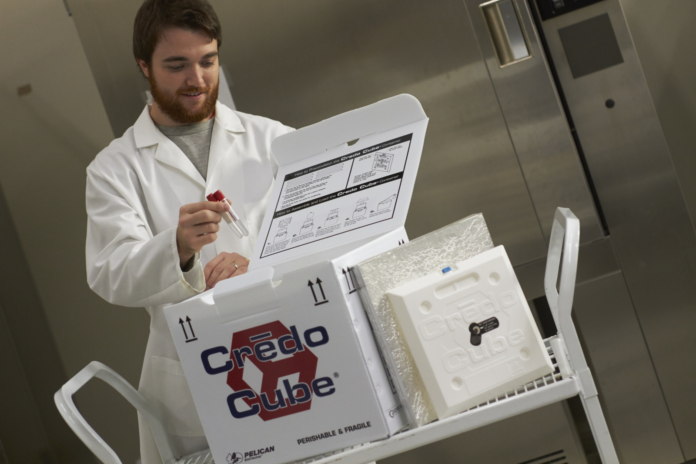The Torrance-based company spent most of 2020 making airtight cases to house ventilators during transport to hospitals while its temperature-controlled storage products were used to shuttle Covid-19 vaccines and patient samples during the Moderna Inc. and Pfizer Inc. clinical trials.
Pelican is also involved in ongoing vaccine distribution efforts after retrofitting some of its products to accommodate the manufacturers’ extremely low temperature requirements.
The frontline work helped the company notch a “mid-single digits” increase in annual revenue last year to “just under $500 million,” according to Chief Executive Phil Gyori.
“When things really hit with a vengeance, around February and March, quite frankly we weren’t sure what it was going to do to our business, and we were pretty concerned like all companies,” Gyori said. “This was not a year that anybody could plan, and there was no playbook. I’m really proud of how our employees responded and how we adapted.”
Pelican’s bright star was its BioThermal division, which posted a revenue increase of more than 20%. Its customers include blue-chip pharma companies such as Eli Lilly and Co. in Indiana, and Johnson & Johnson and Merck & Co Inc. in New Jersey.
The division also sells temperature-controlled packaging to various shipping companies, including Marken, the North Carolina-based clinical trial logistics subsidiary of United Parcel Service Inc.
“We’re in a very on-trend market segment, which is controlling temperature for pharmaceuticals,” Gyori said. “Part of the reason for that is more and more drugs are biologics. So instead of chemical-based drugs, they’re biologic; they (can contain) living, active organisms, and that requires a more delicate transport as it relates to temperature, like a vaccine.”
‘Secret sauce’
‘Secret sauce’
BioThermal’s products, he added, “are greatly preferred in the clinical trials where the cost of failure is huge. When you’re transporting potentially million-dollar payloads, you can’t have a $100 package be the source of failure. And that’s probably our sweet spot.”
Pelican, founded in 1976 by scuba diver Dave Parker, made its name selling reliable and durable equipment cases that are widely adopted by the film and television industry.
The protective cases are also popular with the military, oil and gas producers, as well as the aviation sector. The pandemic, however, put a damper on some of those sales.
“When they stopped shooting TV shows and movies, they didn’t need transport cases, so that that was tough,” Gyori said. “And obviously with aviation — everybody knows what was going on there — when they have to tighten their bud
The “run on ventilators” in the early months of the pandemic, Gyori said, helped Pelican recover some of the losses sustained in the hard-case category.
“We have programs in the U.S., Canada and in Europe, all related specifically to ventilator cases,” he said. “We also had some business in the disaster relief area where our cases are used for remote hospital setups.”
New markets
New markets
“We were seeing people already use our products for that, but they were kind of MacGyvering them to their vehicle,” he said. “(We) launched eight cases that are designed specifically for that application, and they have these tailored attachment brackets so that they can easily be fitted to the vehicle without any drilling into the truck bed. … So far we’ve got really great feedback.”
Pelican has 1,400 employees and operates 200,000 square feet of manufacturing and office space in Torrance, where it makes its protective cases. It also runs a case plant in Massachusetts, while its BioThermal products are made in Minneapolis and in the United Kingdom.
The company’s other facilities include a plant in Plymouth, Minn.; factories in Albuquerque, N.M. and Melbourne, Australia; and partner manufacturing sites in Germany and Mexico.
“We were deemed an essential business, and so the factories have never stopped,” Gyori said, adding that not relying heavily on overseas production helped the company curtail issues with shipping backlogs last year.
Gyori joined Pelican four years ago as part of a succession plan to replace Lyndon Faulkner, who led the company for 14 years and now serves as chairman. Gyori’s team includes Chief Operating Officer Kevin Miniard, who started in March, and Lance Ralls who was appointed chief information officer in October.
“Our company has grown pretty dramatically over the last decade, and it became critical that if we’re going to keep evolving and preparing for future growth, we needed to evolve and upgrade some of our back-of-house functions, (such as) operations and IT,” Gyori said. “We’ve brought in some new blood, with some great new perspective and thinking and processes, and we’re already seeing the benefits of that.”
Ambitious plans
Ambitious plans
Several acquisitions boosted the company’s growth to date, including a 2014 deal for U.K.-based temperature-controlled case-maker and distributor Cool Logistics; a $200 million purchase of South Deerfield, Mass.-based Hardigg Industries in 2009; and the 2020 takeover of Albuquerque-based NanoCool.
“Five years from now, I would want us to be about double the size we are in terms of revenue, and I would imagine we will get there primarily with organic growth,” Gyori said, adding that Pelican will likely pursue an acquisition in the near future.
“I see us growing our market share for sure in the temperature-control packaging arena,” he said. “BioThermal is one of the faster growing companies within that space, but we have a lot of market share upside. And so we’re making big investments in that side of the business.”
Pelican itself presents an attractive acquisition target.
“The market for companies like ours is pretty hot right now,” Gyori said. “We’re performing well, and (Behrman has) owned the company for quite a long time, which is a little unusual for a PE firm … so I think that that’s highly likely.”

